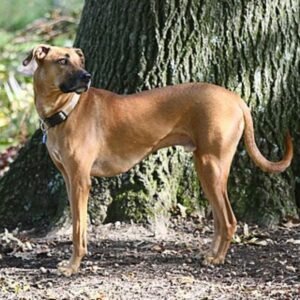Since their first appearance in the 1990’s Mini Goldendoodles have rapidly become the favorites among dog lovers worldwide, and it’s easy to see why. These playful pups combine the intelligence and low-shedding coats of Poodles with the affectionate, family-friendly temperament of Golden Retrievers. Their smaller size makes them perfect for first-time dog owners or families looking for a companion that fits well into both cozy apartments and larger homes.
Whether you’re drawn to their hypoallergenic traits or their easy-to-train personalities, Mini Goldendoodles offer a unique balance of charm, smarts, and adaptability. In case you are thinking about introducing this adorable breed into your home I cooked up this guide to help you make a confident, informed decision as you consider adding one of these lovable dogs to your life.
What Is a Mini Goldendoodle?
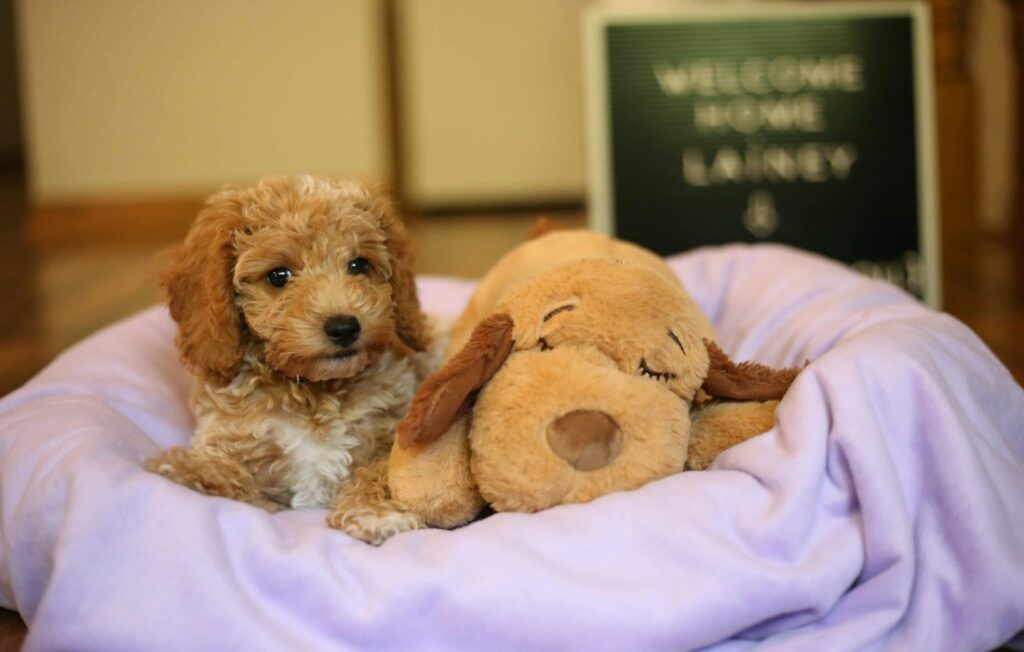

The Mini Goldendoodle has gained popularity over the years, and for good reason. With their irresistible teddy bear-like faces, vibrant personalities, and low-shedding coats, they’ve become a much-loved choice for families, singles, and seniors alike. As a cross between a Golden Retriever and a Miniature Poodle, this versatile breed offers the best of both worlds. But what makes Mini Goldendoodles truly unique? Let’s dive into their origins, appearance, and personalities.
Breed History and Origins
Mini Goldendoodles were first bred during the mid-1990s, a time when breeders were looking to combine the gentle, loyal nature of Golden Retrievers with the intelligence and hypoallergenic traits of Poodles. Originally, Goldendoodles were bred in standard sizes, but the demand for a smaller, more apartment-friendly dog led to the creation of the miniature version by pairing Miniature Poodles with Golden Retrievers. This deliberate crossbreeding created a compact companion beloved for their adaptability and friendly demeanor.
Their surge in popularity can also be attributed to their low-shedding coats, which makes them a great choice for individuals with mild pet allergies. Over time, Mini Goldendoodles have earned their place not just as pets but as therapy and service animals due to their calming temperament and eagerness to please. Learn more about their fascinating history here.
Size and Appearance
Mini Goldendoodles are often described as the perfect-sized dog—not too small and not too big. On average, they weigh between 20 to 40 pounds and stand about 16 to 20 inches tall at the shoulder. However, variations exist based on their parentage, environment, and diet. Some may lean closer to the smaller side, weighing as little as 10 pounds, while others may tip the scale near 35 pounds.
When it comes to their appearance, their coats are what truly set them apart. Mini Goldendoodles boast a variety of coat types, including curly, wavy, and straight. Their fur is famously soft and can range from hypoallergenic to low-shedding. Coat colors also vary widely: you’ll find them in shades like apricot, cream, black, chocolate, and even multicolored patterns like parti or phantom. This diversity in coat colors and textures ensures every Mini Goldendoodle is a one-of-a-kind pup.
Temperament and Personality
Ask any Mini Goldendoodle owner, and they’ll likely gush about how these dogs are the total package when it comes to personality. They inherit a delightful mix of traits from their Golden Retriever and Poodle parents, making them friendly, intelligent, and incredibly affectionate. Known for their cheerful disposition, these dogs thrive on human interaction and love being part of a family.
They’re especially great with children, showcasing patience and a playful energy that pairs well with young kids. Mini Goldendoodles are also sociable with other pets, often making fast friends with cats or other dogs in the household. Their eager-to-please attitude makes them highly trainable, from learning basic obedience commands to mastering complex tricks.
One of their standout traits is their adaptability. Whether you live in a bustling city or a quiet suburb, their balanced energy level fits right in. While they love a good game of fetch or a walk around the park, they’re equally happy curling up next to you on the couch for some downtime. For more on their lovable temperament, explore this Mini Goldendoodle profile.
Mini Goldendoodles are not just pets—they’re companions that enrich your life. Their unwavering loyalty and lovable personalities ensure they’ll always be the heart of the home.
Different Generations of Mini Goldendoodles
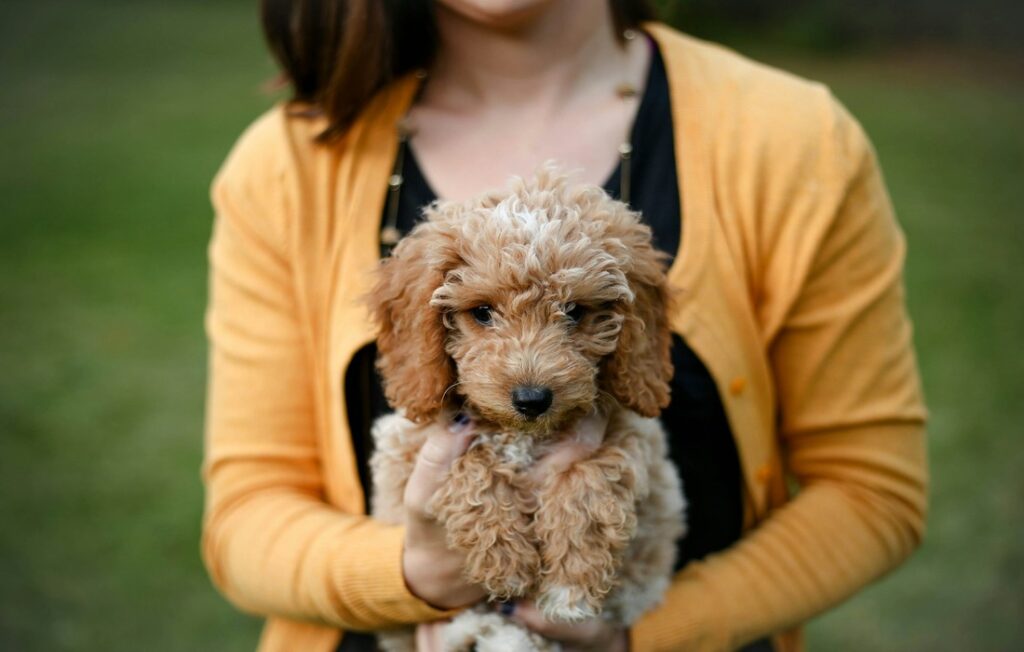

When shopping for a Mini Goldendoodle, understanding their generational differences can feel like decoding a new language. Terms like F1, F1B, and multigenerational may seem overwhelming at first, but they’re important for grasping what to expect in terms of coat, allergy-friendliness, and personality traits. Let’s break it down together.
Understanding F1 and F1B Generations
The F1 Mini Goldendoodle is the first generation, bred by crossing a purebred Golden Retriever with a Miniature Poodle. This 50/50 genetic split offers a balanced mix of traits, including a charming personality and low-to-moderate shedding coats. However, their coat types can vary significantly between wavy, straight, or curly, which means allergy-friendliness isn’t always guaranteed. If you’re banking on their hypoallergenic qualities, you’ll want to dig deeper into family history.
Now, F1B Mini Goldendoodles are a step further in selective breeding. Generally, an F1B results from crossing an F1 Goldendoodle with a pure Miniature Poodle. This increases the poodle-to-retriever ratio to approximately 75% poodle and 25% retriever. Why does this matter? The higher poodle genetic makeup usually enhances desirable traits like tighter curls, lower shedding, and better hypoallergenic qualities. If you’re prone to allergies or prefer a pet requiring less cleanup around the house, the F1B generation might check the boxes. Learn more about the distinctive traits of F1 and F1B generations here.
Still, nothing is one-size-fits-all. F1 Goldendoodles might be your go-to for a mix of Golden Retriever traits, while F1B leans closer to poodle-like characteristics. It’s a balance of what you prioritize—playful shedding vs. allergy-ready curls.
Multigenerational Mini Goldendoodles
Multigenerational Mini Goldendoodles take this idea even further. These dogs are bred from two Goldendoodle parents—often carefully selected over multiple generations. This deliberate breeding creates dogs with finely tuned, consistent traits. For instance, breeders can aim for a specific coat texture, shedding level, or even certain personality attributes. Want a Goldendoodle where surprises are kept to a minimum? Multigenerational pups excel in meeting those preferences.
What makes multigenerational Mini Goldendoodles standout is their predictability. The uncertainty of coat type present in F1s and F1Bs is generally minimized here. Their temperaments are also more uniform, often reflecting balanced energy levels, better sociability, and adaptability in family settings. For families looking for a companion who fits right in, this generation might be your best bet. Click here for a deeper dive into why multigenerational Goldendoodles are a popular choice.
These dogs are commonly hypoallergenic and non-shedding, making them a favorite for those seeking allergy-friendly options. But don’t confuse predictability with lack of personality—they’re still full of charm and quirks, just backed by generations of intentional breeding.
Choosing the right Mini Goldendoodle generation boils down to your lifestyle, priorities, and how much poodle vs. retriever traits you’re willing to welcome into your life.
How to Choose a Reputable Breeder
Navigating the process of selecting a Mini Goldendoodle breeder can feel like a daunting task, especially when the stakes are so high. Your new furry family member deserves the best start in life, and that means buying from a trustworthy, ethical breeder. With a little knowledge and preparation, you can avoid potential pitfalls and find someone who prioritizes the health and happiness of their dogs.
Health Testing and Documentation
Health is a top priority when it comes to any dog breed, and Mini Goldendoodles are no exception. Reputable breeders go the extra mile to ensure their puppies are free from common genetic issues like hip dysplasia, heart conditions, and eye problems.
Here are key things to look for:
- Health certifications: Responsible breeders will provide documentation proving that both parents have been tested for breed-specific conditions. See why testing is essential here.
- Common genetic screenings: Ask the breeder if they’ve tested for conditions such as Progressive Retinal Atrophy (PRA), Von Willebrand Disease, or elbow dysplasia. This ensures your puppy’s lineage is as healthy as possible. Genetic testing benefits the breed long-term, as explained here.
Don’t hesitate to request medical records, and if a breeder is unwilling to share these, it’s a huge red flag.
Breeder Transparency and Practices
Transparency is everything when it comes to choosing the right breeder. A good breeder is more than happy to answer your questions and explain their processes.
Here’s a list of questions you should always ask:
- How are the puppies socialized? Early exposure to different people, sounds, and environments builds a puppy’s confidence.
- What are the parents’ temperaments like? A well-balanced temperament in the parent dogs is a strong indicator of your puppy’s potential personality.
- Can I meet the parent dogs and see where the puppies are raised? Responsible breeders often raise their dogs in home-like environments rather than cramped kennels.
- What’s included in the purchase? Many breeders offer contracts with health guarantees, initial vaccinations, and sometimes even puppy starter kits.
Want a complete checklist of breeder questions? Check out this list from the AKC.
Red Flags To Avoid
Unfortunately, not all breeders operate ethically, and it’s crucial to recognize warning signs before making a purchase. Unethical breeding practices not only harm the animals involved but can leave you with heartbreak later on.
Keep an eye out for these clear red flags:
- Lack of health guarantees: A breeder who doesn’t offer a health guarantee may be hiding genetic or health issues common in the breed.
- No evidence of health testing: If a breeder cannot provide documentation for the screenings performed on the parent dogs, walk away.
- High-pressure sales tactics: Ethical breeders care more about finding the right home for their puppies than making a quick sale.
- Selling through puppy mills: Large-scale operations that mass-produce puppies often neglect the welfare of their animals. Learn how to identify a puppy mill here.
Always trust your instincts. If something feels off—like cramped, unclean facilities or vague answers during your inquiry—it’s best to look elsewhere. The right breeder will make you feel confident and informed at every step.
Our Curated List of Reputable Breeders
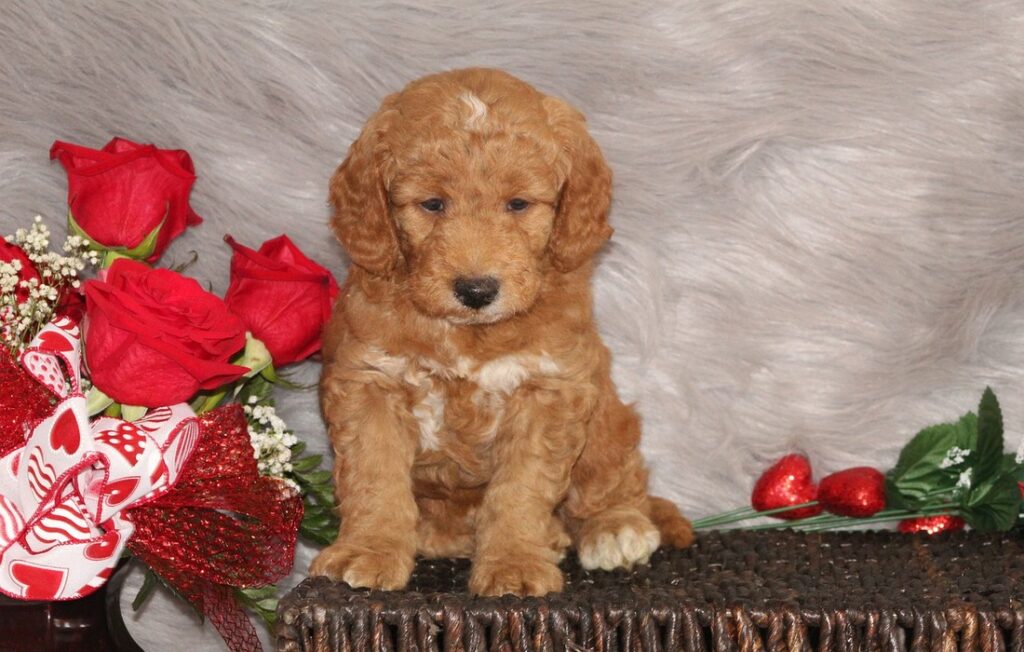

Finding a reputable Mini Goldendoodle breeder is essential to ensure you bring home a healthy and well-socialized puppy. Here is a list of reputable breeders acroos the United States to make your search less time consuming.
1. Mini Goldendoodles of NY
- Location: Pine Bush, New York
- Specializes in multi-generation Petite-mini Goldendoodles, Mini Labradoodles, and Mini Double Doodles. Emphasizes health testing, with all dogs tested for over 151 hereditary defects and diseases. Offers a two-year health guarantee against hereditary disorders.
- Website: https://minigoldendoodlesofny.com/
2. Bella Mini Doodles
- Location: Rochester, New York
- With nearly two decades of experience, Bella Mini Doodles is committed to responsible breeding practices and addresses all health concerns. They offer a two-year genetic health guarantee with every puppy adoption and provide delivery options.
- Website: https://www.bellaminidoodles.com/
3. River Valley Doodles
- Location: New York
- Strives to produce and train socialized, healthy, and gorgeous Goldendoodle and Springerdoodle puppies for responsible and loving owners. They often arrange deliveries near NYC, Boston, NJ, CT, and Long Island.
- Website: https://www.rivervalleydoodles.com/
4. Pine Hill Mini Doodles
- Location: Upstate New York
- Specializes in Mini Goldendoodles weighing 15-25 lbs as adults. Focuses on producing healthy, intelligent, and beautiful Mini Goldendoodle puppies that are easy to train. All parent dogs are DNA and hereditary disease tested.
- Website: https://pinehillgoldendoodles.com/
5. Fox Creek Farm
- Location: Berkeley Springs, West Virginia
- Amy Lane of Fox Creek Farm was the first breeder to create a litter of miniature Goldendoodles and is one of the founding Goldendoodle breeders. They focus on raising healthy multigen Goldendoodles that are perfect for families with kids.
- Website: https://goldendoodles.net/
6. Smeraglia’s Teddybear Goldendoodles
- Location: Alabama
- Offers Teddybear English Goldendoodles, Mini Goldendoodles, and Schnoodles. Known as the #1 Goldendoodle breeder in the U.S., they focus on hypoallergenic and low to non-shedding puppies.
- Website: https://www.teddybeargoldendoodles.com/
7. Lily & Chloe Mini Goldendoodles
- Location: Connect with families for adoption accross the United States
- Connects families with well-loved and cared-for Mini Goldendoodle puppies. They focus on ensuring their pups are ready to meet their new families.
- Website: https://www.lilyandchloepups.com/
8. Family Bred Puppies
- Location: Not specified
- About: Works with small, family-owned breeders who care about their puppies as much as their own families. Offers Mini Goldendoodles available for adoption.
- Website: https://www.familybredpuppies.com/miniature-goldendoodles-for-adoption
9. Happytail Puppies
- Location: North Carolina
- About: Offers Mini Goldendoodle puppies from a network of breeders. Provides a one-year health guarantee and has an emphasis on socialization.
- Website: https://happytailpuppies.com/
Caring for a Mini Goldendoodle
As cuddly and lovable as Mini Goldendoodles might be, it’s essential to understand their unique care requirements to keep them healthy and content. Their mixed heritage comes with specific grooming routines, energy needs, and potential health challenges. Let’s dive into what you need to know to give your Mini Goldendoodle the life they deserve.
Grooming Needs
Mini Goldendoodles are known for their beautiful, low-shedding coats, but maintaining their coat requires consistent attention. Despite being a low-shedding breed, their hair can tangle or mat easily, especially if their coat leans toward the curly side like a Poodle.
- Brushing: Aim to brush their coat at least three times a week with a slicker brush to prevent mats and tangles. For dogs with thicker, curlier coats, daily brushing may be necessary. Regular brushing not only keeps their fur soft but also reduces dirt and debris buildup. Learn more about proper grooming techniques here.
- Bathing: Mini Goldendoodles generally don’t need frequent baths—once every 6-8 weeks is usually enough unless they get especially dirty. Too many baths can strip their coat of natural oils.
- Professional Grooming: It’s worth scheduling professional grooming every 6-8 weeks. Skilled groomers will handle trimming, nail clipping, and ear cleaning, which can sometimes be tricky to manage at home. If you’d like to explore grooming best practices, check out this helpful guide here.
Remember, a well-groomed Goldendoodle isn’t just about aesthetics. Keeping up with their grooming needs contributes to their comfort, health, and overall happiness.
Exercise and Mental Stimulation
While their size may be small, Mini Goldendoodles are packed with energy and love to stay active. Neglecting their need for physical and mental stimulation can lead to boredom or even behavioral issues, so it’s crucial they get the activity they thrive on.
- Physical Exercise: These dogs typically need 30-60 minutes of exercise daily. Activities like walks, fetch, or even swimming are excellent ways to keep them fit. If you’re short on time, mixing in backyard playtime can help—but consistent outdoor activity is highly recommended.
- Mental Engagement: As highly intelligent dogs, Mini Goldendoodles need mental challenges to stay engaged. Puzzle toys, hide-and-seek games, or teaching new tricks can work wonders for their mental stimulation. For more fun ideas to keep your Goldendoodle occupied, have a look here.
- Socialization: Don’t forget that these social pups love human interaction. Make time for cuddles and engagement with the family, and if possible, include trips to a dog park for socializing with other dogs.
A well-exercised Mini Goldendoodle is a happy, well-adjusted companion. Not only will they enjoy their playtime, but they’ll also burn off any pent-up energy that could otherwise lead to mischief.
Common Health Issues
As with any breed, Mini Goldendoodles are prone to certain health conditions that potential owners should keep in mind. Their mixed genetics make them less susceptible to breed-specific illnesses, but they aren’t immune to health challenges.
- Hip Dysplasia: This is a common genetic condition where the hip joint doesn’t fit properly. Symptoms include difficulty standing, limping, or decreased activity levels. Regular vet check-ups and maintaining a healthy weight can minimize risks.
- Progressive Retinal Atrophy (PRA): PRA is a degenerative eye disorder that can eventually lead to blindness. While there’s no cure, early detection can help manage symptoms. If you notice signs like night blindness or bumping into objects, consult your vet immediately.
- Ear Infections: Mini Goldendoodles’ floppy ears can trap moisture, creating an ideal environment for infections. Clean their ears regularly and ensure they stay dry, especially after swimming or baths.
- Allergies: Some Mini Goldendoodles may develop skin or food allergies. If you observe excessive scratching, licking, or inflammation, it might be time to consult your vet for allergy testing.
Routine vet visits and preventative care are vital. Annual exams, up-to-date vaccinations, and routine checks for hereditary conditions will keep your furry friend in top shape. For a deeper understanding of potential health challenges, read more here.
By staying proactive with your Mini Goldendoodle’s health and happiness, you’re setting the foundation for a life full of companionship and joy.
Training Your Mini Goldendoodle
Mini Goldendoodles are known for their intelligence, eagerness to please, and friendly demeanor, making them a joy to train. However, consistent and effective training is crucial to ensure your furry friend grows into a well-behaved and adaptable companion. Whether you’re a first-time dog owner or a seasoned pet parent, these tips will help guide you through the process of training your Mini Goldendoodle.
Housebreaking Tips
Housebreaking your Mini Goldendoodle is an essential first step in your puppy training journey. With patience and consistency, your dog will quickly learn where and when it’s appropriate to potty.
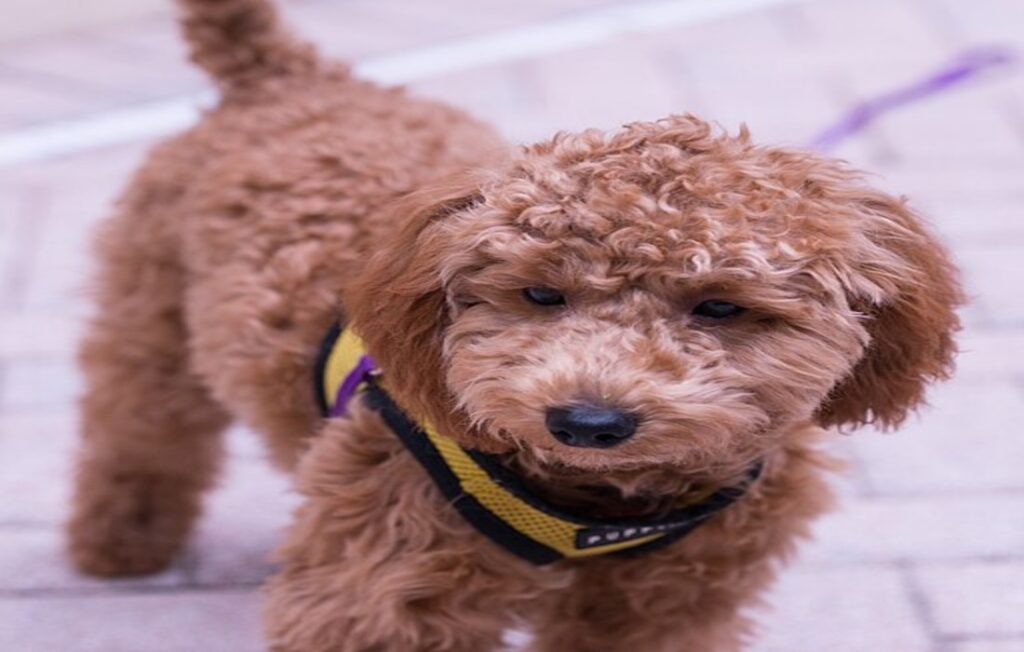

Here are tried-and-true strategies to get you started:
- Crate Training: Utilize a crate to create a safe, den-like space for your puppy. Dogs naturally avoid soiling their sleeping environment, making crates a great tool for housebreaking. Be sure to choose a crate that’s appropriately sized—not too big nor too small.
- Set a Routine: Puppies thrive on routine. Take your Mini Goldendoodle outside at regular intervals—after meals, upon waking up, and before bed. Consistent timing helps them associate outdoor trips with potty time.
- Positive Reinforcement: Reward your pup immediately after they go in the right spot. Use treats, praise, or a cheerful “good job!” to reinforce the behavior.
- Supervision is Key: Until your dog is fully housebroken, keep an eye on them to prevent accidents. If they look like they’re about to eliminate indoors, calmly interrupt and guide them outside.
Stay consistent and patient—potty training takes time, and every puppy learns at their own pace. For more housebreaking insights, check out this guide.
Socialization Strategies
Early socialization is critical to raising a confident and well-mannered Mini Goldendoodle. From interacting with people to exploring new environments, these experiences shape your pup’s temperament and responses.
Here’s how to tackle socialization effectively:
- Introduce New People and Pets: Regularly expose your puppy to a variety of people, including children, adults, and other pets. Supervised playdates with friendly dogs can teach them polite canine interactions.
- Expose Them to Different Environments: Take your Mini Goldendoodle to dog-friendly parks, busy streets, or even nearby businesses. The goal is to introduce them to different sounds, sights, and smells so they become accustomed to change.
- Focus on Positive Experiences: Pair every new experience with something positive, like treats or praise. This builds positive associations and prevents fear or aggression.
- Timing is Everything: Did you know the critical socialization window is between 3 and 14 weeks old? During this time, puppies are more receptive to new stimuli, making it the ideal period to introduce socialization techniques.
Basic and Advanced Obedience
Training your Mini Goldendoodle to follow commands isn’t just about obedience—it builds trust and strengthens your bond. Thanks to their smart and eager-to-please personality, Goldendoodles thrive with consistent training.
Basic Obedience Tips:
- Start with foundational commands like “sit,” “stay,” “come,” and “leave it.”
- Use short and clear commands paired with hand signals for better understanding.
- Stick to five to ten-minute sessions to keep your puppy engaged without overwhelming them.
- Incorporate treats as rewards, gradually replacing them with verbal praise to maintain motivation.
For advanced skills:
- Introduce agility or tricks, such as jumping through hoops or fetching specific items. These activities challenge them mentally and physically.
- Practice recall in environments with distractions, like parks, to solidify your dog’s ability to listen under pressure.
- Consider professional classes or trainers to teach specialized tasks if you’re looking to work on advanced goals, like therapy dog certification or complex obedience sequences. Learn more about effective techniques in this detailed training guide.
Remember, training isn’t a one-time effort—it’s a journey that strengthens the relationship between you and your Mini Goldendoodle every day.
Cost and Budget Considerations
Before welcoming a Mini Goldendoodle into your home, it’s essential to understand both the upfront cost of purchasing your furry friend and the ongoing financial commitment that comes with responsible pet ownership. Planning ahead can save you from unexpected surprises and ensure you’re fully prepared to provide the best for your new companion.
Initial Purchase Price
Mini Goldendoodles from reputable breeders typically come with a price tag that reflects the effort, health testing, and care invested in breeding them. The cost of a Mini Goldendoodle usually ranges from $2,000 to $4,000, though it can sometimes climb higher depending on factors like breeder reputation, bloodlines, coat type, and location.
It’s also essential to ensure you’re working with a breeder who prioritizes the health and well-being of their dogs over profit. Cheaper options may seem appealing, but they often come from unethical sources. Take your time to research breeders thoroughly. For a detailed breakdown of what influences the price of Mini Goldendoodles, you can read more here.
you invest in initial supplies and complete vaccinations. For more practical budgeting tips on Mini Goldendoodle expenses, check this guide.
Final Thoughts
Bringing a dog into your life is a decision that needs thoughtful consideration. With so many breeds to choose from it might be overwhleming. But you can’t go wrong with the Mini Goldendoodle, this adorable and lovely breed offer not just loyalty and affection but also intelligence, adaptability, and endless charm. However, they flourish in homes where their needs for care, grooming, exercise, and companionship are met.
If you’re considering adopting or buying a Mini Goldendoodle, reflect on your lifestyle, time commitment, and budget to ensure you can provide the happy, healthy environment they deserve. Take the time to research breeders, prioritize quality over convenience, and prepare for the lifelong bond you’ll form with your furry family member.
Are you ready to embrace all the joy and quirks that come with Mini Goldendoodle ownership? Let their playful spirit fill your home—and your heart.






